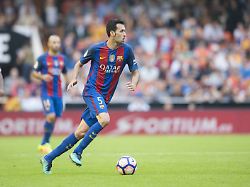Barcelona’s Doctor Strange
How Sergio Busquets manipulated time for years
By Florian Papenfuhs
December 26, 2023, 11:02 a.m
In 2023, football icons will turn their backs on Europe. Cristiano Ronaldo has set off for Saudi Arabia as the figurehead of a new transfer stream, while Lionel Messi has taken early retirement in Miami. He is accompanied by one of the best footballers of all time and a good friend: Sergio Busquets.
Just over two minutes have been played when Sergio Busquets wins the ball in the center circle. When a defender comes towards him, he stops the ball with one foot and passes it to his teammate with the inside of the other. He immediately marches towards the penalty area, where he heel-heels the ball to the man next to him, gets it back and volleys it under the crossbar to make it 2-0. A murmur goes through the audience.
But don’t worry, you haven’t forgotten one of the most beautiful Barça goals in recent years. Because the scene described here does not take place on green grass. It describes a goal in one Indoor soccer game in 2012. Only FC Barcelona players are on the field, with Pep Guardiola and his long-time assistant and then successor Tito Vilanova, who died in 2014, on the sidelines.
“You can’t get to him”
It’s one of the very rare moments when Sergio Busquets does something for the gallery. In which the spectators cheer when he has the ball and his colleagues come over to celebrate a goal with him. He has played almost 900 games for FC Barcelona and the Spanish national team, and since the summer of 2023 he has added a few more for Inter Miami. He was probably not the most noticeable player on the field in any of these games. He scored 20 goals in his professional career. For comparison: Bayern legend Javi Martínez has almost 49 goals, today’s Leverkusen coach Xabi Alonso has 43. Both have fewer games.
Steven Gerrard says of Busquets: “At some point you stop pressing him because it’s so frustrating. You can’t get to him, you can’t get to the ball.” It sounds like a contradiction. Because in addition to his scoring output, which is extremely poor even for a defensive midfielder, he has a physique that hardly any footballer wants. Tall and thin, Busquets stalks the football pitches of Europe for years, a body without any sign of robustness. Despite his size, he is also not a particularly good header player. What is sprinting for Barcelona’s number five falls more into the category of “jogging” for most of the others involved on the pitch.
“The best six in the world”
The fact that a player as powerful and dynamic as Steven Gerrard feels like he can’t get close to Busquets is less due to the speed in his legs than in his head. Seemingly strolling, Busquets repeatedly finds himself in game situations that most of his teammates and opponents don’t know are about to arise. As if he could control time, Barcelona’s own Doctor Strange. The mental advance creates space for other considerations. Where should the ball go next? Do I need a short pass for my teammate to come towards me, or can I send him deep? How do I then position myself most effectively? Questions that Sergio Busquets already seems to have an answer to at the matchday breakfast buffet.
Skills that also inspire Guardiola, initially in Barcelona’s second team. In 2009, he immediately pulled him into the professional squad as the Catalans’ new head coach. It doesn’t take long before the skinny unknown has another prominent fan. “After two or three days of training with him, he came to me and said: ‘I like him!’ Guardiola once explained. “He” is Lionel Messi. For Luka Modrić is Busquets “one of the best midfielders I’ve ever played against.” Modric’s former teammate Casemiro simply sees the Spaniard as the “best six in the world.” There are a number of such quotes about Busquets.
“The device never gets tired”
The “TV Total” cult excerpt “The device never gets tired, the device never falls asleep” is not about him. But it could. Because Busquets shows neither physical nor mental exhaustion. What’s more, he is virtually indestructible throughout his career. He is never out for longer than four(!) games. Permanently accessible and incredibly consistent, he becomes the favorite of his teammates. As long as he is on the field, he can be played. As long as he is passable, his team keeps the ball.
The permanent representation of Catalonia will also be irreplaceable in the national team. The aforementioned Alonso and Martínez also have fewer games because Spain’s anchor doesn’t want to rust for over a decade. Instead there is a whole lot of gold. World champion 2010, European champion 2012, countless club titles. He is constantly on the biggest stages, but the spotlight avoids him. Individual awards are in short supply in Busquets’ trophy cabinet. In 2009 he won the “Trofeo Bravo”, with which an Italian trade magazine chooses the best young player. In 2021, the relatively prestigious trophy for the best player in the UEFA Nations League finals will be added. In all likelihood it will be the last.
Because even if he seemingly manipulates time on the field at will, Busquets cannot stop it. In the summer of 2023, he and his long-time companion Jordi Alba will move from sunny Barcelona to sunny Miami, where they will meet their former teammate Messi again. What happens after the end of your career? His discoverer Guardiola already had a hunch in 2018: “Sooner or later he will be a coach. We will see Busquets on the bench.” One can only wish the same for his future midfielders.
